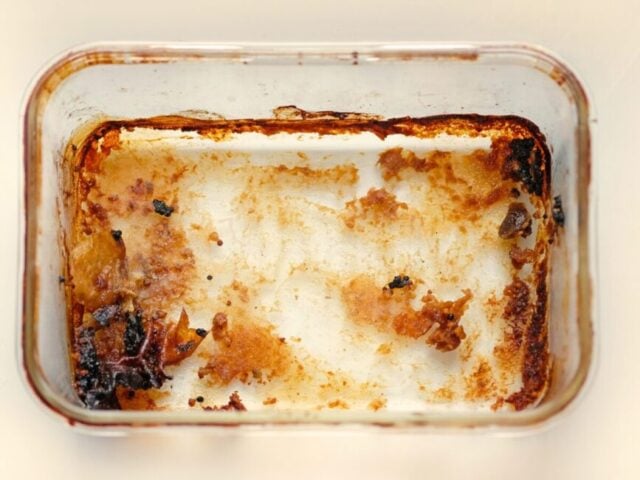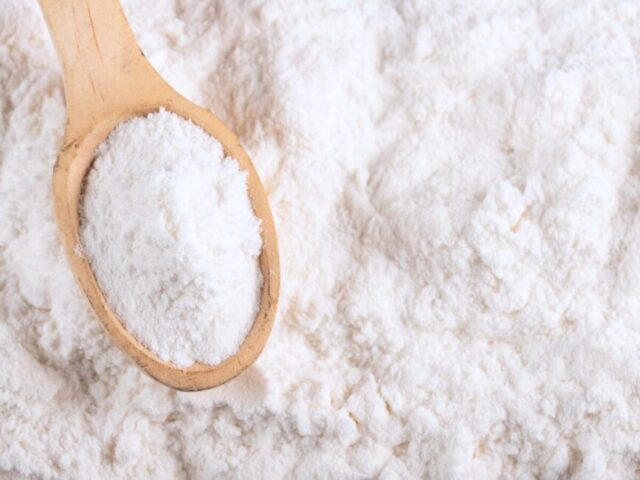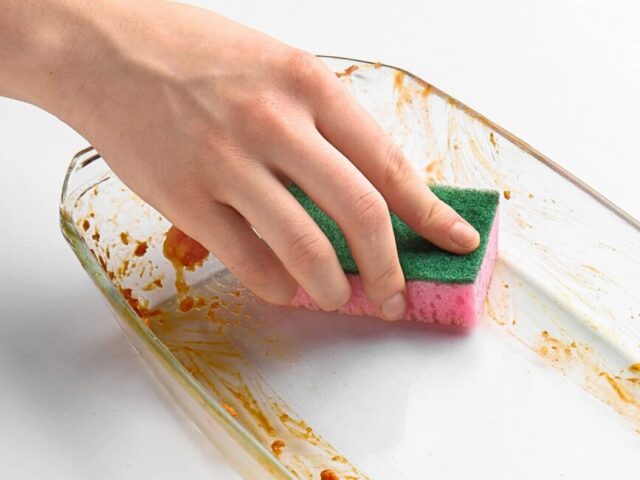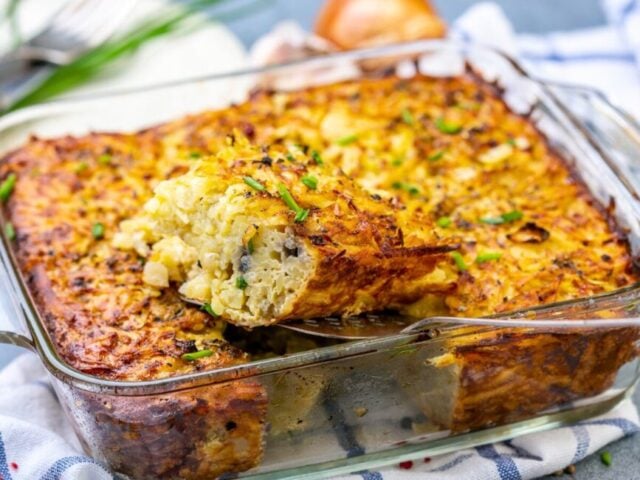You know the drill. You make an amazing casserole that the whole family loves, and then you’re stuck with a glass casserole dish that looks like it’s hosted a mud-wrestling match. I know none of us look forward to the cleaning part, but it’s not as difficult as you might think. With just a few clever cleaning tips and a little elbow grease, you can get those pesky stains and stuck-on food off in no time.

The Battle Plan
First things first: we need to arm ourselves with the essentials.
You will need:
- a trusty spatula (plastic is your best bet to prevent scratching your dish)
- a scrubby sponge
- baking soda
- dish soap
- hot water
Step 1: Spatula to the Rescue
Your spatula is here to set you up for success. Start by scraping off as much of the food in the dish as you can. If it makes it easier, give your dish a rinse throughout this process to help you loosen that stuck-on food.
Step 2: The Baking Soda Solution
Next, you’re going to channel your inner chemist and sprinkle a good amount of baking soda along the bottom of the dish. Baking soda is great for cleaning a lot of things, especially baked-on grease and stubborn stains.
Step 3: Make It Soapy
Now add a few squirts of your favorite dish soap to the mix and fill the dish with piping-hot water (be careful not to burn yourself!) and let it sit. You can leave it for 15 minutes or let it soak overnight for the more stubborn stains. The longer it soaks, the easier your job will be.
Step 4: Round Two with the Spatula
After your dish is done soaking, you’ll notice that those stubborn bits will have loosened up. Now’s not the time to be shy. Get in there with your spatula and show them who’s boss! Then give it a good rinse.
Step 5: The Encore
If you still have some stubborn spots, give it another round of the baking soda treatment and let sit for 15 minutes, then scrub with your scrubby sponge.
Step 6: Dry and Shine
Once you’re satisfied with the cleanliness of your casserole dish, give your dish a final rinse and let it dry. Voilà! You’re ready to store it away until next time.
Why Baking Soda?

What makes baking soda the go-to for cleaning glassware? It’s all about the science.
Gentle Abrasion
Baking soda is mildly abrasive, enough to make it perfect for attacking stubborn stains and baked-on grease without scratching your glass bakeware.
Chemical Reaction
Also known as sodium bicarbonate, baking soda reacts to both acids and bases to break down food molecules. When you mix it with water, it becomes a mildly alkaline solution, which is great at cutting through grease. This chemical reaction further helps it dissolve and loosen any food buildup.
Deodorizing Properties
Not only is baking soda great at cleaning, but it also deodorizes, which is especially useful if you’ve cooked something pungent. Let’s face it, no one wants old food smells to linger and affect the taste of future meals.
Safe and Non-Toxic
If you’re like me, you probably try to be aware of the chemicals you bring into your home (especially those you use on the surfaces you eat off of). What I love about baking soda is that it’s a safe, non-toxic choice as far as cleansers go, leaving you with less to worry about.

FAQs
Can I use oven cleaner on my glass casserole dish?
While oven cleaner might be tempting to use, it’s usually too harsh for glass cookware. Stick with gentle cleansers like baking soda and hot soapy water to avoid damaging the glass.
What’s the best way to remove burnt-on food from glass pans?
Your best option is a long soak in hot soapy water followed by a good scrub with a non-abrasive sponge. Whenever that doesn’t cut it, you’ll want to bring in the baking soda and water and let it sit before scrubbing.
I’ve heard of tricks like using an unused dryer sheet or a Mr. Clean Magic Eraser to get rid of stuck-on grease. Do these work?
While some people swear by these cleaning methods, I find them to require more elbow grease than the baking soda cleaning solution, and dryer sheets contain a LOT of terrible chemicals (so much so that I’ve actually done away with them entirely for laundry uses, and switched to wool balls!) The Kitchn actually has a great breakdown and ranking of each casserole dish cleaning method, including using Bar Keepers Friend, to get off cooked-on food residue. Read all about it here.
Can I use steel wool or abrasive sponges on my glass dishes?
Avoid using anything too gritty on glass, like steel wool or abrasive sponges. These can leave scuff marks and deep scratches, and make your dishes more susceptible to breaking. Always choose a soft, scrubby sponge or a nylon sponge when working with glassware.
Is it safe to clean my glass bakeware with vinegar?
Definitely! White vinegar is another great choice for removing yellow grease stains and other residue without having to use harsh chemicals. Just mix equal parts of vinegar and water, and soak the dish for a bit before scrubbing.
How can I prevent food from sticking to my glass casserole dish next time?
A light coating of cooking spray before you add your ingredients can help prevent food from sticking, as well as cleaning your dish RIGHT after serving. (Leaving food overnight can make it more difficult to scrape off any sticky residue in the morning.)

You’re A Casserole Dish Captain!
I hope this guide helps you have a lot less cleaning time, and a lot more relaxation time. Now you can have epic bake-offs in your kitchen without worrying about the dirty dish aftermath. Next time you pull out your glass baking dish or Pyrex casserole pan for family gatherings, you’ll know exactly how to get the best results with the least effort.
Do you have any tips or tricks on cleaning your casserole dishes? If so, we’d love to hear about it! Be sure to drop a comment below!
The post The Best & Easiest Way to Clean a Glass Casserole Dish appeared first on Steamy Kitchen Recipes Giveaways.
from Steamy Kitchen Recipes Giveaways https://ift.tt/WTqGCr7
via New Kitchen Special
No comments:
Post a Comment